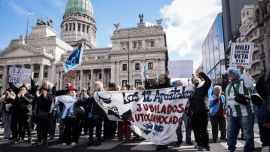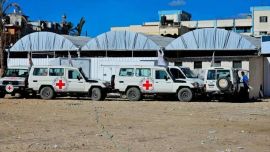This month’s anti-democratic events in Brasilia accelerated the conversations between the foreign ministers of Brazil and Argentina, confirming the first official visit of President Luiz Inácio Lula da Silva as unmovable and the revival of the bilateral relations between Brazil and Argentina.
Santiago Cafiero, 43, recognises the importance of regionalisms in the new international cycle and says the expectations of a stronger Mercosur breathe fresh air into the Alberto Fernández government. For the foreign minister, Lula’s arrival in office “offers the necessary regional leadership with Brazil returning to multilateralism.”
What did [Brazilian] Foreign Minister Mauro Vieira say to you when the mob stormed Brasilia?
There were two such different scenarios because I got to know my Brazilian colleague when accompanying President [Alberto] Fernández to Lula’s inauguration on January 1 in Brasilia and we saw those same squares later invaded brimming with joyful, hopeful and expectant people, a joy we shared not only because of the government, not only because Lula was being installed in the post he both historically and currently deserves but also because I had accompanied Alberto during his campaign, not only ahead of his presidential victory but even before the PASO primaries, when he visited Lula in jail.
In Curitiba.
We embraced many comrades that January 1, recognising those who had been there with us.
You got to know Mauro Vieira for the first time on that January 1.
I got to know Mauro Vieira then. He is very knowledgeable about Argentina, having many friends here. We conversed, reflecting on the great expectations and hopes of the people, tainted only a week later by the attack on the institutions in all its brutality and hatred. From hope to hatred in a week. No sooner did I see the images than I called him up because we had a deal on the basis of those conversations and those because Lula was coming to town on Sunday night [January 22], on an official visit, his first to another country.
What does that mean?
A whole lot, it’s all about our main trade partner, the necessary regional leadership of Lula, Brazil returning to multilateralism and the region and it’s all about Lula entering into a third presidential term without bans through the popular vote of Brazilians. From the commercial viewpoint, it’s huge since Argentina needs a dynamic Brazil. From the political viewpoint, a role of greater integration is really needed. That was something Alberto had been building and somehow maintaining. When we came to office, [Donald] Trump was still governing in the United States...
And [ex-president Jair] Bolsonaro in Brazil.
Bolsonaro in Brazil, despising the region, towards which he had a punitive outlook if anybody thought differently or departed from his script – a totally violent and aggressive outlook towards the region. Rebuilding mechanisms like CELAC [the Community of Latin American and Caribbean States], rebuilding the bilateral dialogue broken throughout the region was something Alberto did. So much so that he was rewarded for his work in building regional integration with the vote of confidence of his colleagues, becoming president of CELAC and continuing in that task.
This also signifies the return of Brazil to CELAC.
And now Brazil is returning to the region. Brazil had been absent from the debates of the region and multilateralism. Lula means returning to the region and that for us is essential, not only for questions of trade but also foreign policy. It’s fundamental that Argentina and Brazil move together on very concrete daily issues. Argentina and Brazil have something to say about this international supply crisis, the globalisation suffering an increasingly accelerated decadence. From 2008 onwards a falling international trade has suffered this decadence but it has been accentuated with the pandemic and now with the war. That multilateralism in crisis needs new regional chains. Many people talk of what is to come, globalisation by region, regionalism and here we need Brazil playing that role. Alberto built and sustained a big part of that but there was always a quadrant of that leadership missing, which was Brazil, and now we have it. Those are the most important things.
What responsibility do you attribute to the social networks, hate speech and Bolsonaro himself for the assault against all three branches of government in Brasilia?
I think that political leaders who for whatever reason – whether belief or speculation – feed hate speech end up sowing hatred in society and that breeds haters. They have to be held responsible.
Do you think Bolsonaro will go to jail?
I don’t know what the charges are nor how the Brazilian judicial system works but I do hold him responsible. Bolsonaro is politically responsible for what happened.
On January 24 the VII CELAC summit will begin and the Economic and Energy Integration Agreement with Brazil will be signed. What can you tell us in advance about that agreement?
The day before we have the official visit of Brazilian President Lula da Silva with everything that implies. That will be the road map for the agreements to be signed and for re-launching and advancing in the relationship and strategic association we have with Brazil, placing it on another level. That’s what it’s about. The personal relationship between both presidents helps, of course, as does their ideological affinity over what Argentina, Brazil and the region need, but what is fundamental is the permanent work of our embassy and ministries, linking up with the Brazilian ministries and Lula’s government team. We’re going to advance in projects related to energy integration and the challenges of regional financial integration, in particular where Argentina and Brazil are concerned. We will also advance in scientific and technological agreements, such as the application of nuclear technology. We also plan to advance with Unasur, which to us represents a relevant and important South American bloc which needs to be given value.
Lula in Brazil, [Gustavo] Petro in Colombia, [Gabriel] Boric in Chile, [Luis] Arce in Bolivia, AMLO [Andrés Manuel López Obrador] in Mexico. Is there a third “pink wave” in Latin America?
When we started governing, there was a great solitude because many of the leaders you have just named had yet to be elected. And really there Alberto, with great conviction while maintaining his political values, advanced in what he believed to be necessary, which was to integrate Latin America and the Caribbean with differing opinions. But he always tried to seek balance and arrive at where we are now, a CELAC summit in Buenos Aires with 33 of the region’s countries participating.
What happened in the elections with the social and popular claims in the countries we have just named?
I don’t know. I am convinced that all the phenomena of the anti-democratic and deeply neo-liberal right failed in the region, which is what permitted the popular movements to recover quickly, in some cases regaining democracy such as, for example, Bolivia – a very different case – where there was a coup d’état and a ban but Arce ended up winning the presidency, thus showing the Bolivians elected a government other than the one the right wanted to impose on them. There is a revival of popular movements in Latin America and the Caribbean but also a very different outlook to previously.
Is there a shift towards the centre from the physical violence of the 1970s and the oral violence at the turn of the century but now more like social democracy?
We Latin Americans and Caribbeans have our own analytical and ideological categories and the popular has much more to do with it than the traditional identifications of left or right in the European or North American style. And what has been installed are popular movements which realise the needs of their peoples and understand the world in which they must be developed, with plenty of pragmatism, naturally. Their stances are not ideological but rather pragmatic, designed to act within the given ecosystem. Above all they try to generate projects of deep transformation, at greater or lesser speed but always going in the same direction. What unifies them, the common denominator of those popular governments today, is the struggle against inequality, for example.
After Buenos Aires, Lula will carry on to Montevideo where he will see [Uruguayan President Luis] Lacalle Pou. Does Lula have the idea of Mercosur being the starting-point for the integration of all South America into a single economic bloc?
Mercosur is South America’s most important tool of regional integration, without doubt, with its 32 years of experience in different times and at different speeds. In the first 10 years there was major intra-zone trade which afterwards swung to primary products with the commodities boom replacing the intra-zone commerce, which is more industrial, which exports jobs and which mobilises resources which are far more relevant from the viewpoint of creating jobs in different countries. This focus on primary products made Mercosur unbalanced. What I believe Lula to be doing, and what I understand to be the road ahead from what we have been saying, is to re-industrialise Mercosur within that context of global supply chains entering into crisis, first for the pandemic and then for the war.
Bringing back the factories from China to local territories...
Relocating, that’s what we’re coming back to. We in Latin America, the Caribbean, South America and Mercosur in particular have to agree rapidly over which link of the chain we wish to be. Exporters of natural resources? Or being the link which creates jobs, knowledge and technological transfer, incorporating Argentine and South American talent into production? That is the discussion where I think Brazil will take the lead. I believe that Lula’s trip to Uruguay is important, of course, but it seems to me that if we reinforce Mercosur by incorporating new members like Venezuela and Bolivia [who have been members before], we will end up completing all that and at the same time making Mercosur attractive for other South American countries as the necessary regional bloc. With a regional bloc of 260 million inhabitants with universities and a scientific and technological complex with the capacity to make satellites and vaccines – as Brazil and Argentina do – we can negotiate from a different position.
South America is one region and Europe another. You have announced a trip to Brussels to meet [European Commission Vice-President] Josep Borrell. What expectations do you have of an agreement with the European Union and now that Lula, not Bolsonaro, runs Brazil, would any type of modification be possible?
We believe that the agreement will undergo modifications from the preliminary agreement signed and celebrated in 2019. From then on Mercosur did next to nothing, merely responding to different initiatives, questions and requirements made by Europe without making any requirements of its own. The whole chapter of cooperation needs to be discussed for the productive and financial asymmetries between both blocs to be balanced and Brazil agrees with that. Since signing that preliminary agreement in 2019 Mercosur has been static, almost paralysed while the EU advanced with the European Green Pact with environmental and health restrictions and barriers which could accentuate the asymmetries between both blocs yet further so there is much to be discussed. Our intention is, of course, to advance towards a good agreement protecting our PyMES (small and medium-sized companies), Argentine production and Argentine workers.
Could it be said that Lula is committed to the best possible election for Frente de Todos this year?
No, but what I do see is great commitment and affection towards Alberto. Let’s put that in perspective. Alberto went to see Lula in jail, not for a photo-op or to score media points or anything like that because it was in a totally adverse context. He mobilised opinion and used his voice permanently to tell the concert of nations that the imprisonment of Lula was an injustice. He did this in Europe and when he was president too. Whenever he had the chance to talk to European leaders, he told them what was happening in Brazil with Lula’s imprisonment. On the latter’s side, let’s place this in perspective. Lula comes to Argentina to celebrate with us the Day of Democracy and Human Rights on December 10, 2021, right at the start of his electoral campaign. Afterwards, that same Sunday Lula won the election, he got on the phone to Alberto and said to him: “Please come, I want to hug you.” So Alberto jumped aboard a plane the very next day and went and hugged him. And Lula’s first visit is to Argentina.
That night he put on his Cristina Fernández de Kirchner cap [reading “CFK 2023”].
Yes, of course, because there’s great affection there, that’s fine. I believe that the main thing is that Lula really wants to help Argentina and fundamentally wants Argentina to do well. And in that sense I make his words mine, we understand that the vision of the country we expressed has much more to do with this regional context of Brazil, which is Argentina’s main trade partner but also the main strategic partner of Argentina.
Will Alberto Fernández finally make the trip to see [US President Joe] Biden?
That depends on appointment diaries. The meeting was scheduled, then suspended because President Biden had Covid-19, as was public knowledge, and has still not been rescheduled but it will be. In any case we are developing a potent agenda with the United States. We have important US capital investments in lithium, the auto industry, manufacturing sectors and knowledge industries. Half of Argentina’s exports of services based on the knowledge sector go to the United States so we have a fluid market. Yes, we have some barriers and some issues we need to resolve, of course, but the relationship is really good.
You are one of the closest persons to President Alberto Fernández, you were his Cabinet chief and his campaign manager who accompanied him throughout the campaign. He has said that he will participate in the PASO primaries seeking the presidential candidacy. How do you see his aspirations today, are they still there?
The president has always been very clear – he is the chairman of the Justicialist [Peronist] Party and will do what it takes for Peronism to win this year. He has always had a trusting and very generous relationship with me and I’m going to work on his premise of Peronism winning the elections because Peronism is the political force which can develop Argentina for the future – that’s how we understand it today with the president. He has had to build with much against him – the crisis of 2018-2019, the debt, the default of [Mauricio] Macri because the truth is that the euphemism of “reprofiling” means not complying with your contracts basically and when you do not comply with contracts, you enter into bankruptcy and that’s what happened. A short time afterwards the pandemic and the war followed. The difficulties which Argentina has faced in these times have been colossal, unique, and yet the president has managed to build the Argentina of the future and for that we need Peronism to continue.
Does that mean that if Peronism were to improve its chances were the president not to run, he would go along with that?
He has always said that he will do what he has to do for Peronism to win because it is the future of Argentina.
How about yourself, will you be a candidate for anything in the next elections?
No. I’m going to work for a Peronist victory, those are the instructions which the President has given me and I will keep working for that. I am party secretary-general at national level and my task is to work in all the provinces for Peronism to win them all and for the governors seeking re-election to be re-elected. Where we are not already governing, we can win in those provinces. My task is to bring order to politics, not to be a candidate this year.
Production: Melody Acosta Rizza and Sol Bacigalupo.


























Comments